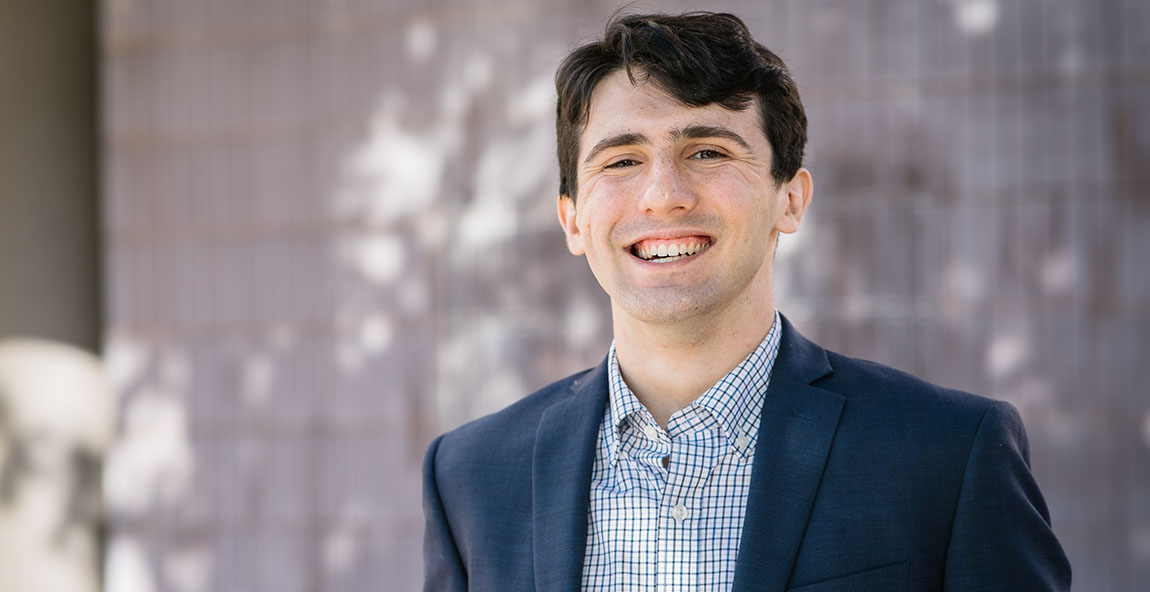Personally Speaking: Kyle Ropski ’22
Kyle Ropski is an economics and sustainability studies double major from Ambler, Pennsylvania.Wednesday, November 18, 2020 02:39 PM
 Kyle Ropski '22. Photo by Marco Calderon
Kyle Ropski '22. Photo by Marco CalderonPersonally Speaking is a feature of Muhlenberg Magazine in which our writers interview students and alumni about their own personal stories. This article was originally published in the Fall 2020 issue of Muhlenberg Magazine.
He sees his fields of study as inevitably interconnected.
“Every environmental science class and economics class I’ve taken, they talk about each other. The only way that you’re going to convince people to move to more sustainable sources of energy is money. With a lot of problematic companies, their infrastructure is so strongly built on nonrenewable resources like fossil fuels, and it costs too much to transition. When we’re looking at solutions in my classes, we’re saying, ‘What is a sustainable yet cost-effective way to mitigate these problems?’”
He became president of the nonpartisan BergVotes club his sophomore year...
“My father is involved in politics in my hometown, so I’ve grown up understanding the importance of voting. During orientation, all the students were walking out of the Center for the Arts to cross Chew Street, and there was somebody in a BergVotes T-shirt handing out forms and yelling, ‘Register to vote!’ A week later, BergVotes was dorm-storming in Walz Hall, and I said I wanted to get involved. After two or three months of going to club meetings, I ran for and became secretary. The entire rest of the executive board went abroad this spring, so I decided, ‘Might as well run for president.’”
...and he’s led the group through an election year like no other.
“In February, the e-board and a couple professors attended the inaugural Eastern Pennsylvania Student Voting Summit in Philadelphia. We drafted a strategic action plan for how we were going to increase voting on campus and make sure all the first-year students got registered. We practically had to throw out the whole plan. This fall became more of a semester designed to make sure that everybody was registered to vote in whichever way was most convenient to them in their situation.” (Learn more.)
He’s part of the Muhlenberg Scholars honors program...
“The Office of Admissions selects a group of students, between 10 to 20 per class year, from all different majors and backgrounds, to be part of this honors program. You’re put in a first-year seminar with the other new Scholars, and the group takes one course together each year. As our mission statement says, we’re really about people from all different areas of knowledge working together. Two people I’m living with are also Muhlenberg Scholars, so I can thank the program for bringing me some of my best college friends.”
...and he was able to turn current events into a compelling research project.
“Last year, our required course was on fairness. When COVID hit, it made for a strong final paper. I worked with my roommates and fellow Scholars, and we focused on the topic of the fairness in distribution of waivers to allow businesses to stay open as essential businesses in Pennsylvania. There were cases where there would be two car dealerships on either side of the street, and one was allowed to be open while the other had to close. We wrote a lot about contractors and construction: Construction of medical facilities was allowed to continue, but in one case, it was a giant medical building that wasn’t going to be finished until 2023. That crew was deemed essential. Meanwhile, an independent contractor working to finish residences for students to occupy at the end of summer was not allowed to continue. He was like, ‘That project is higher risk because there are more people working there. With this one, it’s just me.’ We found there was a lot of inconsistency.”
He and his fellow Scholars are working to create a more unified, supportive program.
“Before the pandemic hit, we were trying to make the program like more of a family for all four classes of Scholars on campus. We hosted a fall meet and greet last year where we had apple cider and invited all the new Scholars. The week we left campus in the spring, we were supposed to have an event with the Allentown Symphony Orchestra. We want people to be friendly and brainstorm together, because that’s when the best ideas come, and that’s what the Scholars are all about. If you’re a first-year student and you meet a junior at the fall meetup who’s taken a 400-level psych class, and you have a question about your intro class, you should be able to ask. We want the Scholars to help the Scholars.”
